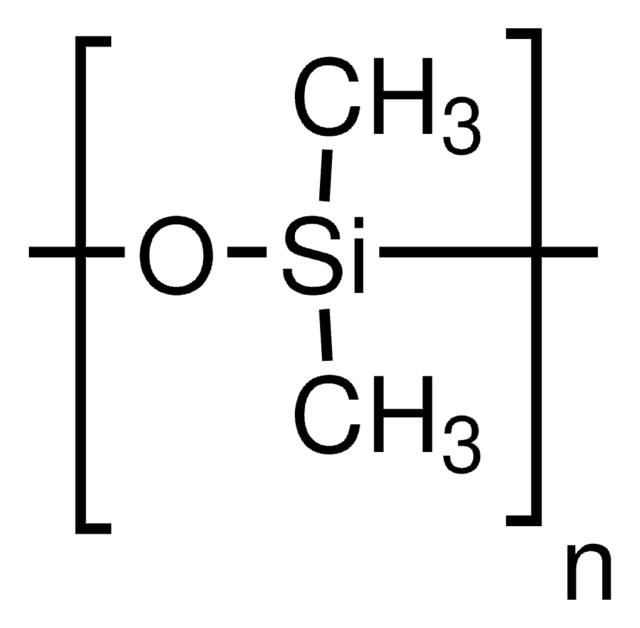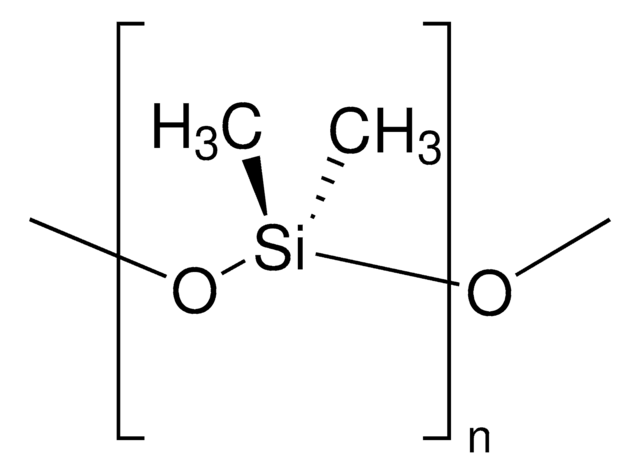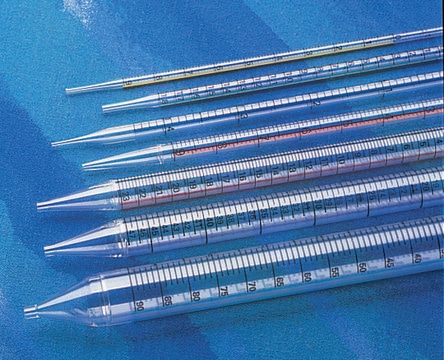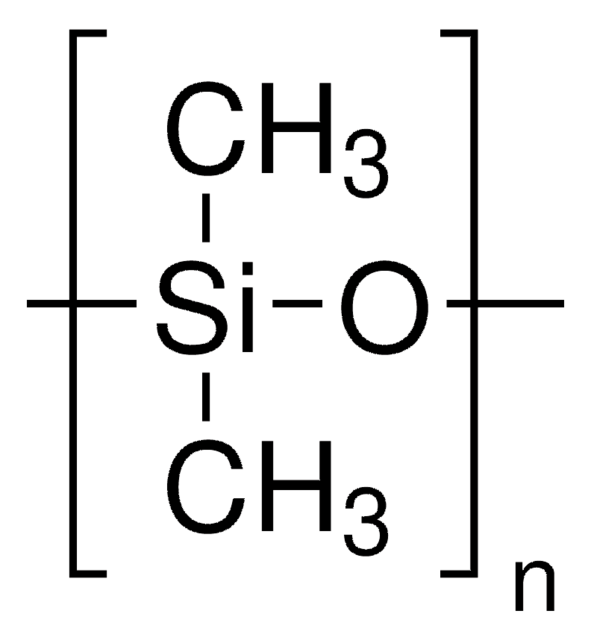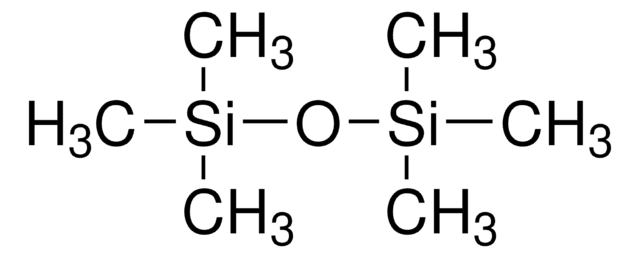Alle Fotos(3)
Wichtige Dokumente
DMPS5X
Dimethylpolysiloxan
viscosity 50 cSt (25 °C)(lit.)
Synonym(e):
Polydimethylsiloxan
Anmeldenzur Ansicht organisationsspezifischer und vertraglich vereinbarter Preise
Alle Fotos(3)
About This Item
CAS-Nummer:
MDL-Nummer:
UNSPSC-Code:
12352200
PubChem Substanz-ID:
NACRES:
NA.25
Form:
liquid
Empfohlene Produkte
Form
liquid
Qualitätsniveau
Mol-Gew.
~3,780
Viskosität
50 cSt(25 °C)(lit.)
SMILES String
[Si](=O)(C)C
InChI
1S/C2H6OSi/c1-4(2)3/h1-2H3
InChIKey
SEUDSDUUJXTXSV-UHFFFAOYSA-N
Suchen Sie nach ähnlichen Produkten? Aufrufen Leitfaden zum Produktvergleich
Anwendung
Dimethylpolysiloxane has been used:
- in culturing mouse embryos
- in preparation of oil-based nano-adjuvant candidates
- to reduce the brain movement in the post-cat craniotomy process
Klares, farbloses Flüssigpolymer, das als stationäre Phase in der Gaschromatographie und als Entschäumer verwendbar ist.
Biochem./physiol. Wirkung
Dimethylpolysiloxane is a silicon-based organic polymer, inert and non-toxic. It is applicable in the pharmaceutical, food, and cosmetic industry. Dimethylpolysiloxane is excreted unchanged unaltered in the faeces and is non-mutagenic.
Dimethylpolysiloxane is used in protein chromatography and affininty chromatography. Dimethylpolysiloxane was used to determine that postprandial inflammatory response after ingestion of heated oils in obese persons is reduced by the presence of phenol compounds.
Lagerklassenschlüssel
10 - Combustible liquids
WGK
WGK 2
Flammpunkt (°F)
609.8 °F - closed cup
Flammpunkt (°C)
321 °C - closed cup
Persönliche Schutzausrüstung
Eyeshields, Gloves, multi-purpose combination respirator cartridge (US)
Hier finden Sie alle aktuellen Versionen:
Besitzen Sie dieses Produkt bereits?
In der Dokumentenbibliothek finden Sie die Dokumentation zu den Produkten, die Sie kürzlich erworben haben.
Kunden haben sich ebenfalls angesehen
Zengguang Ma et al.
Neuroscience letters, 637, 161-167 (2016-11-20)
Understanding the mechanisms underlying negative hemodynamic responses is critical for the interpretation of functional brain imaging signals. Negative imaging signals have been found in the visual, somatosensory and motor cortices in functional magnetic resonance imaging (fMRI) and intrinsic signal optical
Comparison of cortical responses to the activation of retina by visual stimulation and transcorneal electrical stimulation.
Sun, et al.
Brain Stimulation, 11, 667-675 (2019)
A Perez-Herrera et al.
Molecular nutrition & food research, 56(3), 510-514 (2011-12-14)
Heating during the process of cooking alters the chemical properties of foods and may affect subsequent postprandial inflammation. We tested the effects of four meals rich in different oils subjected to heating on the postprandial inflammatory metabolism of peripheral blood
Vyacheslav N Fishman et al.
Chemosphere, 84(7), 913-922 (2011-07-09)
The applicability of three different Silphenylene Silicone co-polymer (Si-Arylene) GC stationary phases (J&W Scientific DB-5ms, Varian VF-5ms, and VF-Xms) has been evaluated for the separation of all 136 tetra- through the octa- chlorinated dibenzo-p-dioxins (PCDD) and chlorinated dibenzofurans (PCDF) from
Mara I Orozco et al.
Journal of agricultural and food chemistry, 59(13), 7194-7202 (2011-06-08)
The influence of deep frying, mimicked by 20 heating cycles at 180 °C (each cycle from ambient temperature to 180 °C maintained for 5 min), on the unsaponifiable fraction of vegetable edible oils represented by three characteristic families of compounds
Unser Team von Wissenschaftlern verfügt über Erfahrung in allen Forschungsbereichen einschließlich Life Science, Materialwissenschaften, chemischer Synthese, Chromatographie, Analytik und vielen mehr..
Setzen Sie sich mit dem technischen Dienst in Verbindung.